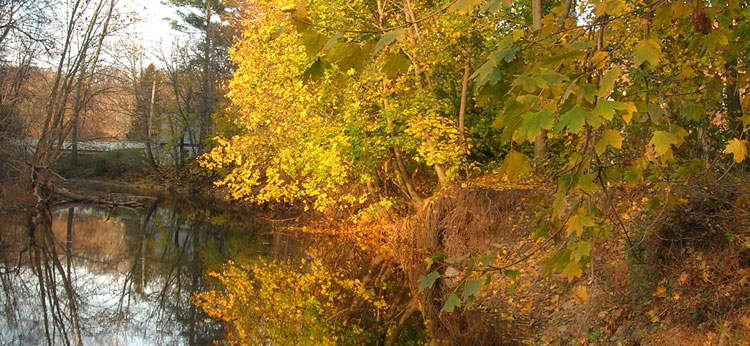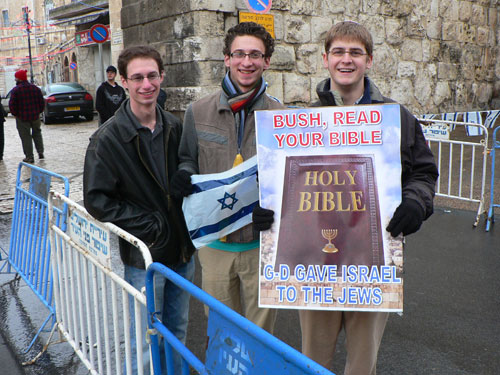 David Landis, dplandis@mosaicmennonites.org
David Landis, dplandis@mosaicmennonites.org
Many people come to the Holy Lands trying to change the world. They come with an agenda, either to speed up the end of the world or find personal spiritual epiphany. Sometimes they try to call down justice to give the land to the Jews or create a Palestinian state. In comparison, most of the people who were born here seem to just want to live their lives in peace. In a land that has been a crossroads of trade, culture and religion for millennia, they are used to visitors coming and going with crazy ideas and absurd goals.
My most meaningful experiences in the past four and a half months have not been with revolutionaries, peace activists or religious leaders. They come from the normal people who populate the towns and cities, spending time with their families, and going to work each day. These relationships are built within an atmosphere of hospitality sharing the normal parts of life—coffee, tea, falafel and shwarama. These people seem to have a greater ability to see their neighbors as human beings, not as others representing a specific religious or ethnic background.
I’ve spent a lot of time walking the routes that Jesus would have traveled regularly in the Galilee. Nazareth, Cana, and Capernaum, as well as most of the places mentioned in the Gospels, were almost inconsequential in relation to the broader ruling empire. The two largest cities of power and glory in the region—Tiberias and Sepphoris—were never mentioned in scripture. Jesus’ disciples were common peasants and laborers with mixed and ambiguous perspectives on the Roman Empire. Many of them would have spent most of their lives just trying to feed their families.
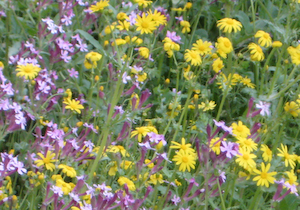 Last week my Israeli friend Maoz and I took a journalist and photographer from the Israeli Newspaper Ha’aretz on the Jesus Trail, a hiking route that we are developing to connect these places. It was a lot of fun to share some of the places of Jesus’ life with them, explaining why they were significant to his history and the Christian story. When we passed by an ancient synagogue at the ruins of Arbella, they shared pieces of their Jewish heritage with me.
Last week my Israeli friend Maoz and I took a journalist and photographer from the Israeli Newspaper Ha’aretz on the Jesus Trail, a hiking route that we are developing to connect these places. It was a lot of fun to share some of the places of Jesus’ life with them, explaining why they were significant to his history and the Christian story. When we passed by an ancient synagogue at the ruins of Arbella, they shared pieces of their Jewish heritage with me.
Together we visited the Mount of Beatitudes, all remarking on the ugliness of the church’s interior and how much more beautiful the green paths of the countryside is in comparison. I think it all made us wonder about the difference between Jesus the Jewish peasant traveler and the Christianity that has developed since he walked these hills 2000 years ago.
I am currently taking a seminary course that explores the first century context of Jesus’ life. In my research, I am continually struck by his normalcy. Although history does indicate that his life brought revolution to western civilization, I often wonder if his intention was to be someone who would change the world. My suspicion is that he was just trying to live his life well and help a diversity of others to do the same, directing their journeys toward God.
There is a saying that if you spend a week in Israel you can write a book about your experience, and that if you stay for a month you can produce a really good article. The adage continues saying that if you stay here much more than this, you won’t even know what to say.
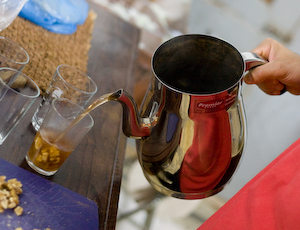 The longer I stay in Nazareth, the more I just want to live my life in the company of close friends, sharing the hospitable space that happens over a cup of coffee or dinner. This renews and sustains our relationships and brings us joy each day. And perhaps because they’re not trying to start a revolution, these interactions may change the world.
The longer I stay in Nazareth, the more I just want to live my life in the company of close friends, sharing the hospitable space that happens over a cup of coffee or dinner. This renews and sustains our relationships and brings us joy each day. And perhaps because they’re not trying to start a revolution, these interactions may change the world.

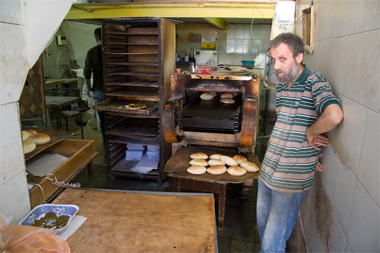 In the morning I often go into the old Nazareth market to buy fresh pita bread for breakfast, where a small bakery is located on the corner near the White Mosque. The bakery is a maze of clockwork conveyor belts that passes dough through the oven, depositing hot puffed pita balloons onto the tray below, where I can watch them deflate as they cool. The store is run by a hunched-over greying Muslim man with glowing eyes. He speaks English well and is always friendly when I come to buy my daily bread.
In the morning I often go into the old Nazareth market to buy fresh pita bread for breakfast, where a small bakery is located on the corner near the White Mosque. The bakery is a maze of clockwork conveyor belts that passes dough through the oven, depositing hot puffed pita balloons onto the tray below, where I can watch them deflate as they cool. The store is run by a hunched-over greying Muslim man with glowing eyes. He speaks English well and is always friendly when I come to buy my daily bread.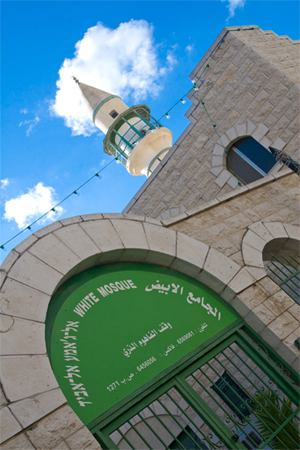 I am challenged by the initiative of the Muslims of Nazareth to extend a hand of coexistent hospitality to their Christian neighbors. I am encouraged by the 138 Muslim scholars, clerics, and intellectuals who came together in October to unanimously declare the common ground between Christianity and Islam in a historic document entitled, “
I am challenged by the initiative of the Muslims of Nazareth to extend a hand of coexistent hospitality to their Christian neighbors. I am encouraged by the 138 Muslim scholars, clerics, and intellectuals who came together in October to unanimously declare the common ground between Christianity and Islam in a historic document entitled, “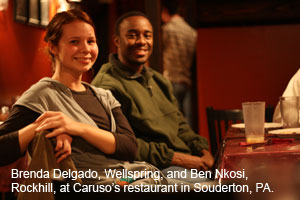 David Landis,
David Landis, 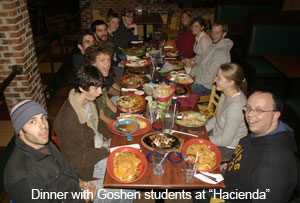 Although it might seem obvious, we clearly discovered that the very act of going and listening is the most practical starting point for understanding each other. In a world where those close to us are often separated by vast geographic distance, it takes a lot of energy, time and financial investment to make these journeys. Yet these precious resources of our culture are what we sacrifice because we care. An incarnate sacrifice indicates that we are committed to actively pursuing relational understanding.
Although it might seem obvious, we clearly discovered that the very act of going and listening is the most practical starting point for understanding each other. In a world where those close to us are often separated by vast geographic distance, it takes a lot of energy, time and financial investment to make these journeys. Yet these precious resources of our culture are what we sacrifice because we care. An incarnate sacrifice indicates that we are committed to actively pursuing relational understanding.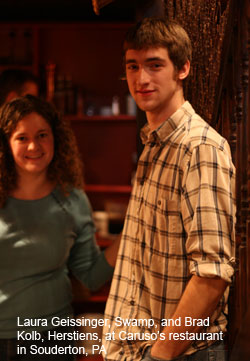 Much of the pain that estranges us from our church community is due to broken relationships. We grow up in a tightly connected group seeking to explore what it means to personally follow Jesus with our daily decisions. It’s a difficult process that often separates us from each other. For the church community to holistically engage this learning process, we need to be able to re-imagine how to move toward each other.
Much of the pain that estranges us from our church community is due to broken relationships. We grow up in a tightly connected group seeking to explore what it means to personally follow Jesus with our daily decisions. It’s a difficult process that often separates us from each other. For the church community to holistically engage this learning process, we need to be able to re-imagine how to move toward each other.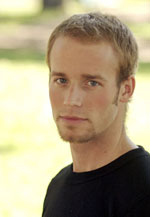 Our leadership cultivation and communication team meets on Tuesday mornings at Bucks County Coffee in Philadelphia’s Manayunk neighborhood. I often wake up early to make the bike trek south from Harleysville, finishing the route along the Schuylkill River.
Our leadership cultivation and communication team meets on Tuesday mornings at Bucks County Coffee in Philadelphia’s Manayunk neighborhood. I often wake up early to make the bike trek south from Harleysville, finishing the route along the Schuylkill River.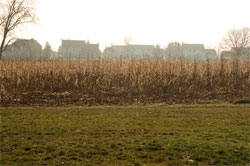 I was the fifth passenger in Earl Anders’ car, crammed into the back seat with two older Mennonite women with coverings, glad that I was offered a ride instead of biking through the dreary day. Most of the drive’s conversation was in the back seat, observing how greatly the landscape has changed since they have last been taken this trip to the area where they grew up. They talked about the tragedy of increased housing prices and decreased number of farms, and how years ago the boys used to shake the bridge across the creek when the girls would walk across. They kept apologizing for the conversation.
I was the fifth passenger in Earl Anders’ car, crammed into the back seat with two older Mennonite women with coverings, glad that I was offered a ride instead of biking through the dreary day. Most of the drive’s conversation was in the back seat, observing how greatly the landscape has changed since they have last been taken this trip to the area where they grew up. They talked about the tragedy of increased housing prices and decreased number of farms, and how years ago the boys used to shake the bridge across the creek when the girls would walk across. They kept apologizing for the conversation.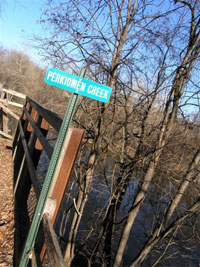 I was on. I shared about Bikemovement and our purpose, struggles and dreams. I shared mostly with photos and personal stories. We talked about how many churches are struggling to connect with their young adults, how many are leaving and not returning. They mentioned how the Baptist church next door is always full to the brim on Sunday. We acknowledged that we all have struggles and broken relationships and that the church can be a relevant community to gather and grow together. They shared with me how they used to bike around the area on single speeds to get to school or visit friends. Some said they used to go to church events for the social space, perhaps to meet the girls from the far edge of the conference—Blooming Glen, about 10 miles up the road.
I was on. I shared about Bikemovement and our purpose, struggles and dreams. I shared mostly with photos and personal stories. We talked about how many churches are struggling to connect with their young adults, how many are leaving and not returning. They mentioned how the Baptist church next door is always full to the brim on Sunday. We acknowledged that we all have struggles and broken relationships and that the church can be a relevant community to gather and grow together. They shared with me how they used to bike around the area on single speeds to get to school or visit friends. Some said they used to go to church events for the social space, perhaps to meet the girls from the far edge of the conference—Blooming Glen, about 10 miles up the road.